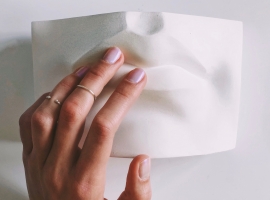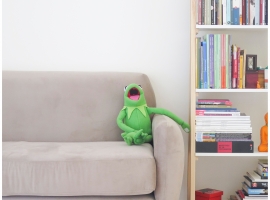What’s the right medicine?
When it comes to medicines, science is yet to find that miracle drug that will prevent dementia or ‘cure’ it. Geeta Iyer explores why, as a caregiver, she chooses love and kindness over medicines and their side effects for her loved one (LO)…

I was on my morning walk when I ran into an old friend of dad’s.
“How is he doing?” he asked.
“The same, he has his good and bad days,” I said.
There is really no ‘getting better’ for dementia patients, but I think I have definitely gotten better at managing this difficult responsibility.
I often try to recall the progression of dad’s dementia in terms of before and after our move to India. I was too preoccupied in survival mode to keep a journal, but Facebook is usually great with sending me memories from years past. Here is one such Facebook post from February 21, 2018:
“We have been trying to convince Appa he is home and not traveling. We point to familiar objects to prove this to him. He gets it one minute and forgets the next. Now, he is trying to convince himself that this is not a plane and he doesn’t need to get off anywhere. After about two hours of this, he says, “Naan kozhandai ayaachu, ada vida mosam! (I am like a child, in fact, even worse).” He asks, “What has happened to me?” One can only imagine how scary it must be to not know where you are, how you got here, or who the people around you are. Alzheimer’s is a cruel disease.”
Well, he is still on that plane getting anxious about not having a ticket and when we should get off. Some of the things that have changed in this ‘after’ period relate to sleep, food, and the bathroom. I think sleep, or rather sleeplessness, deserves an entire chapter in any caregiver’s manual.
Lack of sleep
Lack of sleep probably ranks as the #1 issue for most caregivers. Dad was always a light sleeper, but in combination with dementia, I started to get sleep deprived along with him. About a year ago in the US, he was still able to find the bathroom and his bed at night most of the time. In India, both of these skills almost instantaneously disappeared from his brain. This caused many vicious circles for me, the primary one being “I was cranky and depressed because I couldn’t sleep”. As a ray of hope, I want to point that this is in the past tense by about three months or so.
Thanks to Maushi, our hired caregiver, I no longer have to suffer like this on a daily basis. I still dread being on night duty like I was two days ago, when Maushi suddenly didn’t show up. She has somehow figured out his nighttime idiosyncrasies and manages to get some sleep herself. I sleep next to him on her off days and lay awake the entire night, so that I can respond to his every movement. He goes to bed around 9 pm or slightly before. After about 3-4 hours of sound sleep, he has a tendency to keep lifting his head and laying down again. Each time I would ask him if he needed to pee. It was hilarious when after a few times of this, he asked me in a groggy voice, “Why do you keep asking me that?” I was surprised that he remembered.
Overall, after about eleven months in India and witnessing varying sleep patterns, trying different medicines, we have ended up at our current ‘not so bad’ state, which we have become accustomed to. The first few months in India were a struggle. I did not have the help I do now, and I got barely two-three hours of sleep each day. The sleep issue was compounded by dad’s new problem of urinary retention. He would sometimes need to go every 10 minutes, in small quantities. Once awake, he would want to wander and even get a bit aggressive if we tried to stop him.
Our family doctor prescribed a medicine that seemed to solve the problem of frequent urination immediately, but one of the ingredients (Finasteride) caused excessive itching and he would end up with scary bruises from scratching. This also meant he was now not sleeping for a different reason. The doctor prescribed a different version of the drug, which has luckily worked so far. We were now left with the only other problem at night, lack of sleep due to dementia!
So far, we had stayed away from giving any kind of drug for dementia-related symptoms, which included sundowning, wandering, and aggressive behavior at times. When things got to be overwhelming, I decided to consult a neurologist. I took some videos of dad so that the doctor could see what we were dealing with. By now, I had Maushi at night, but It would get really loud at night and I often had to intervene. Since we were so averse to giving him most drugs due to our fear of their side effects, the doctor decided to start with 3mg of Melatonin, which he called as ‘playschool’ level. About a week later, I messaged the doctor, “I think dad may need something stronger to calm him and control his irrational behavior, especially after 4 am. He has emotional outbursts from anger; often, cries remembering his mom or his brother and gets extremely anxious that he is alone without any money. He starts wandering, removing his clothes, bedsheets, and tries to get into nooks and crannies. Here is a video of one of these episodes.”
The doctor prescribed a small dose of Quetiapine, but I had to stop that after just one night. Dad’s behavior had now become bizarre and he said that he was scared. He also seemed to have lost all his strength suddenly, couldn’t walk, looked extremely drowsy and his speech was incoherent. The doctor switched him to Olanzapine, which made the situation completely unmanageable. At this point, the neurologist suggested a psychiatrist evaluate dad. I knew what that meant, more drugs on a trial-and-error basis. I decided to keep him on just Melatonin, which seemed to cause him no obvious harm and made him drowsy around 9 pm every day. He still wakes up around 3 am sometimes but these days, he doesn’t have much energy to wander. Right or wrong, I have chosen not to go beyond dad’s primary care physician, who happens to be a family friend. No more specialists to fine tune my dad’s health to perfection. We just want to keep him comfortable. There are difficult days and some that I would consider fantastic, but I mostly rely on caregiver social media groups for tips and tricks. CBD oil (just Google it!) is discussed quite a bit in those forums and I have wished I had access to it, to get us through days when he would remain distraught and not sleep. There are other sleep aids I have read about, like the weighted blanket, but it is quite warm here and dad doesn’t like anything covering him. In general, I will be open to trying anything that does not have a chemical formula associated with it!
Sleep and time away from our LO are probably most valuable for caregivers. Affordable hired help has made both possible for me to a great extent and I am grateful for it.
When it comes to medicines, science is yet to find that miracle drug that will prevent dementia or ‘cure’ it. The general understanding is that the available drugs can only slow down the progression and help with the symptoms to some extent. That is valuable to many but in my dad’s case, we don’t want to subject him to the effects of chemicals this late in his life. Instead, we plan to wrap him with as much love, kindness, and affection as we possibly can!

Related links:



There are no comments